The benefits, harms and rules for eating pineapple during pregnancy
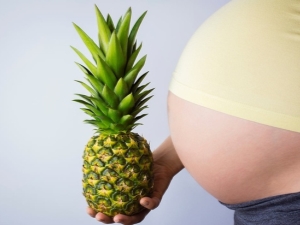
Pineapple is a famous exotic fruit that is loved by most adults and children. Many women eat pineapples because they contain a large amount of bromelain, a substance that helps to reduce excess weight. As for pregnant women, pineapple can be a good fruit addition to their daily menu. However, with this tropical fruit should be handled with care so as not to harm your health and the successful development of the baby.
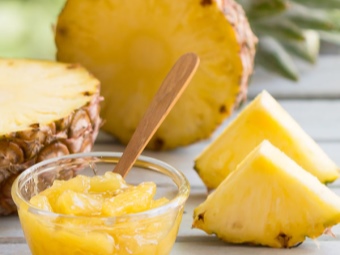

Benefit and harm
Pineapple during pregnancy is undoubtedly useful for women, as it stimulates digestion, contains important vitamins and minerals, and is also indispensable for stimulating the body's metabolic process. But do not forget that this fruit has both a positive effect on the body of a pregnant woman, and a negative one.
First, we note the beneficial qualities of pineapples.
- Pineapple is a sunny fruit. Its bright yellow juicy pulp has a delicate aroma, pleasant taste, which in itself cannot help improving the mood of the future mother, increases the tone of her body and increases the desire for an active lifestyle.
- An exotic fruit not only improves digestive processes, but also saturates the body with vitamins A, groups B, C, D. In addition, the fruits also contain valuable trace elements - iron, copper, magnesium, zinc, potassium, calcium, phosphorus and others.Fresh pineapples are able to replenish the missing amount of vitamins and minerals during pregnancy.
- Pineapple juice cleanses the walls of blood vessels from cholesterol deposits, relieves inflammation and swelling in varicose veins, and makes blood less viscous. Thanks to pineapple, a pregnant woman can get rid of heartburn, as well as excess fluid retention in the body, which is manifested by edema.
- It has been scientifically proven that pineapples can improve brain function, stimulate memory and protect the nervous system from overload. Such factors are very important for a future mother carrying a child.


In addition to the positive characteristics of pineapple, if used ineptly, it can also manifest itself from the negative side.
- An exotic fruit in some women can provoke the development allergic reaction therefore, you need to eat pineapple in small quantities and at the same time observe your well-being. In addition to the fact that allergies can begin in the mother, a similar manifestation is possible in the future in the baby.
- Excessive consumption of fresh fruits can cause uterine muscle contractions and provoke a miscarriage or early birth that happened before the due date.
- Natural pineapple juice is very aggressive, and getting into the stomach, it mixes with stomach acid, increasing its concentration. If a woman suffers from gastritis or an ulcer, such a fruit can cause a sharp exacerbation of these diseases. Pineapple juice corrodes not only the walls of the stomach, but also the mucous membrane of the lips, and can also destroy tooth enamel, especially if it already has minor damage, which often happens during pregnancy.
Obstetricians and gynecologists are wary of tropical fruit and do not advise pregnant women to eat it in large quantities.


Indications and contraindications
Despite the positive and negative properties of tropical pineapple, only the doctor who observes you can determine whether it can be eaten or not during pregnancy. Knowing your medical history and the history of the development of pregnancy, the specialist will be able to assess whether or not you can use this fruit for nutrition.
Indications for eating pineapple are presented below.
- Bromelain, which is found in large quantities in fresh and ripe pineapple, is a component that has the property of breaking down the protein structure of animal origin. Bromelain enzyme allows a pregnant woman to absorb the valuable protein that enters the body with food. It is the protein component that is the most important and basic material for building organs and tissues in a developing baby.
- Pineapple is a juicy fruit fiber rich. It has an antibacterial property, thereby protecting the intestines from the development of decay or fermentation processes in it. If a pregnant woman suffers from stool disorders, fresh pineapple will help to normalize it in many cases.
- Eating an exotic fruit will help a pregnant woman cope with such a formidable disease as thrombosis. Thinning the blood, fresh pineapple improves tissue trophism and improves free blood circulation through the veins and blood vessels.
- Tropical fruit allows significantly improve the processes of digestion of food. Pineapple juice causes the production of a large number of digestive enzymes, which improves the functioning of all organs of the gastrointestinal tract, reducing the load on them.
- Often, pregnant women suffer from bouts of nausea and vomiting, which are with toxicosis. If you drink a glass of pineapple juice, then the condition of the expectant mother will noticeably improve.
- Regular consumption of ripe pineapple juice prevents excess weight gain during pregnancy, removes excess water from the body, increases appetite and speeds up metabolic processes.
Due to the high content of B vitamins, pineapple is a good sedative for expectant mothers, positively affecting their nervous system.


Pineapple also has a number of contraindications. They must be taken into account during pregnancy.
- A tropical fruit that grows in hot countries is not typical for the body of a resident of Russia. Given that during the gestation of the fetus, a restructuring of all body systems occurs, the reaction to pineapple can be unpredictable. If you have a history of allergies, then you need to use this fruit with a great deal of caution or completely abandon it.
- Pineapple is not recommended for eating if a pregnant woman has a history of gastritis with an increased level of gastric acidity, peptic ulcer of the stomach or intestines, diseases of the pancreas and liver. Caution should be taken with tropical fruit and those who have kidney problems and a tendency to cystitis.
- Diabetes mellitus of any type is a contraindication to the use of pineapple - its pulp or juice.
There is a medical opinion that in order to train the immunity of an infant, a mother should consume foods that are classified as allergenic in small quantities. But this must be done strictly in doses, in which case the risk of developing an allergy in a baby will be much lower, since his body has already learned to adapt to various allergens even during fetal development.
The biggest danger lies in overeating pineapple. This fruit is eaten in the amount of several slices, and natural freshly squeezed juice is recommended to be diluted with water before use.
If you do not follow these medical recommendations, then even healthy pregnant women can experience a breakdown in the gastrointestinal tract or food allergies.
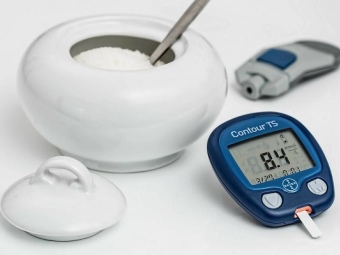

What is the best way to eat?
During gestation, pineapple can be consumed by pregnant women in the form of slices of pulp or juice. If you can’t find a fresh pineapple, but you really want this particular fruit, then canned slices can replace it. Unripe pineapples taste unpleasant, their juice is very caustic and burning, after eating it, burns of the mucous membrane of the mouth and lips are obtained, and the intestines can react to such food with sudden onset of diarrhea, followed by dehydration. In a ripe tropical fruit, the burning properties of the juice have already disappeared, but not completely. The taste of a ripe fresh fruit is pleasant, and the aroma resembles a mixture of strawberries and citrus. This delicacy is pleasantly refreshing and invigorating.
Concerning canned fruit, then after undergoing heat treatment, it loses its valuable vitamin qualities, and there is very little benefit from such a delicacy.In addition, the canned product, as a rule, contains a large amount of sugar, which acts as a preservative.
Excess glucose will not benefit the body of a pregnant woman, especially if she has pancreatic disease or gestational diabetes.


How to use in different trimesters?
At any stage of pregnancy, there are dangers that you should be aware of and behave with extreme caution so as not to harm the unborn baby during its gestation. The first and third trimesters of pregnancy are considered especially dangerous.
The first
In the early stages of pregnancy, a woman is advised to carefully monitor her diet and consume only those foods that can provide the embryo with the amount of nutrients necessary for development. Just a couple of pieces of pineapple will help make up for the lack of vitamins and minerals, as well as eliminate the nausea that occurs with early toxicosis. If you do not exceed this dose, then fresh pineapple in the first trimester of pregnancy can be very useful.
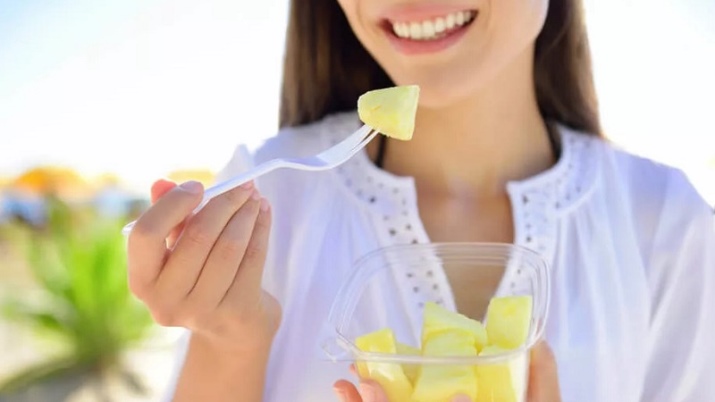
Second
In the second trimester, eating fresh pineapple is also possible. The development of pregnancy at this time is physiologically considered the most calm period of bearing a child. Pineapple at this stage of pregnancy helps prevent frequent constipation in case of problems with bowel function, this fruit eliminates swelling of the lower extremities, and also contributes to a stable mood and quick sleep for a pregnant woman. Fresh tropical fruit can improve the tone of the body, give a good mood and optimism.
During the second trimester, fresh pineapple also consume no more than 2-3 slices per day. It is not recommended to exceed this dose, as there is a risk of developing gastritis or allergies.
Often, during this period of pregnancy, women may experience problems with the outflow of bile - in this case, pineapple does not need to be eaten in any form, since the situation may worsen significantly against the background of its intake.
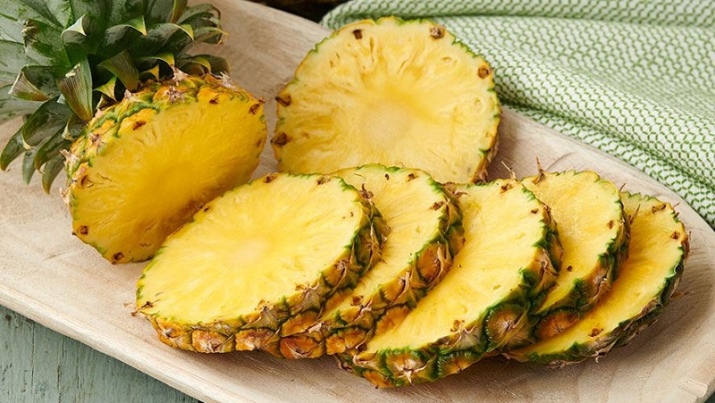
Third
In the third trimester of pregnancy, in the late stages before childbirth, fresh pineapples are allowed to be consumed with great care, but it is worth knowing that at the 38th week of gestation there is a great danger that this tropical fruit will provoke contractions and premature birth. It is especially dangerous if the course of pregnancy proceeds with various complications. It has been observed that pineapple and its juice stimulate the uterine muscles quite strongly, therefore if you eat it more than 2-3 pieces, active labor may suddenly begin.
In the third trimester pregnant women suffering from gestational diabetes caused by pregnancy are also allowed to consume pineapple. There are not so many sugary components in it - less than in other citrus fruits, and the juice containing the bromelain enzyme in its composition helps to reduce excess weight. Nutritionists report that the calorie content of fresh pineapple is no more than 49-50 kcal per 100 g of product.
Before childbirth, at the 40th week of pregnancy, obstetricians recommend that women in whom the opening of the cervix is difficult and too slow eat pineapple. This fruit helps to expand the cervix and helps prepare it for the birth process. Under the influence of fresh pineapple juice, the uterus of a pregnant woman will be in constant tone, which will contribute to the appearance of labor pains.Summing up, we can conclude that fresh and ripe pineapple during pregnancy is a useful product if you use it in limited quantities, listen to the doctor's recommendations and carefully monitor your well-being.


For information on how to eat right during pregnancy, see the following video.

















